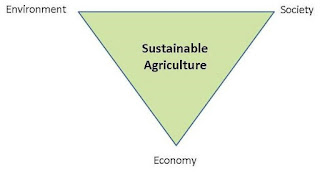“Nutrition Security Suposhan through Sustainable Agriculture”
Agriculture has changed dramatically since the end of World War II. Food and fiber productivity has soared due to new technologies, mechanization, increased chemical use, specialization, and government policies that favored maximizing production and reducing food prices. These changes have allowed fewer farmers to produce more food and fiber at lower prices.
Agricultural sustainability rests
on the principle that we must meet the needs of the present without
compromising the ability of future generations to meet their own needs.
Therefore, long-term stewardship of both natural and human resources is of
equal importance to short-term economic gain. Stewardship of human resources
includes consideration of social responsibilities such as working and living
conditions of laborers, the needs of rural communities, and consumer health and
safety both in the present and the future. Stewardship of land and natural
resources involves maintaining or enhancing the quality of these resources and
using them in ways that allow them to be regenerated for the future.
Nutritional security is defined as “a situation that exists when all people, at all times, have physical, social, and economic access to sufficient, safe, and nutritious food that meets their dietary needs and food preferences for an active and healthy life.”
Worldwide, agriculture and farming systems intrinsically depend on the climate but have dramatically changed due to technological progress and expansion, socioeconomic development, shifts in consumption patterns, and the threat of environmental degradation. Almost half of the Earth’s farmable land has been converted to croplands, pastures, and rangelands. On the other side, farmers and land managers have affected the agricultural ecosystem through extracting farming and abusive use of resources to increase food production to satisfy either local consumption or trade. Nearly one in three people in the world (2.37 billion) did not have access to adequate food in 2020 an increase of almost 320 million people in just 1 year. Consequently, food and nutrition insecurity and climate change emerged as the most pressing and urgent challenges for the achievement of the Sustainable development Goals and the ideals of Agenda 2063. Presently, both developed and developing nations are facing urgent and interconnected challenges that are mining hope for securing food for the growing population and restoring the environment and natural resources.
Sustainable agriculture directly
contributes to the achievement of food security and nutrition through the
production of food security and nutrition through the production of food but also
contributes indirectly to the increase in greenhouse gas emissions, which are
mainly composed of carbon dioxide, methane, etc. Indeed, eco-efficient and
increased environment efficiency in agricultural production is needed to
achieve the respective SDGs and targets.
“Food Security and Nutrition and Sustainable Agriculture”, aims to gather expertise in the different complementary and non-complementary fields related directly to food security, food security and nutrition, the sustainable production of foods, and the eco-efficiency of agricultural systems.
MSC I YEAR




Comments
Post a Comment